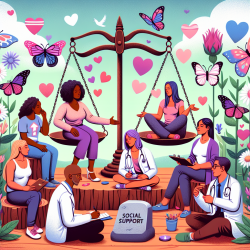Understanding the Impact of Violence and Social Support on Transgender Women
The recent study titled "Social Support and the Association Between Certain Forms of Violence and Harassment and Suicidal Ideation Among Transgender Women" provides crucial insights into the mental health challenges faced by transgender women. As practitioners, understanding these dynamics is essential for improving our support strategies and interventions.
Key Findings from the Research
The study, conducted across seven urban areas in the United States, revealed that 59.7% of transgender women experienced various forms of violence and harassment, while 17.7% reported suicidal ideation in the past year. Notably, the research highlighted the moderating role of social support, particularly from family, in the relationship between violence and suicidal thoughts.
Implications for Practitioners
Practitioners working with transgender women can draw several actionable insights from this research:
- Enhance Social Support Networks: Encourage the development of robust social support systems for transgender women, emphasizing the importance of family, friends, and significant others.
- Address Violence and Harassment: Implement interventions that specifically target the reduction of violence and harassment against transgender women. This includes creating safe spaces and advocating for policy changes.
- Integrate Holistic Approaches: Adopt integrated, holistic approaches that consider the socio-ecological factors affecting transgender women, such as economic dependence and public attitudes.
- Collaborate with Communities: Work closely with transgender communities to co-design interventions that are culturally sensitive and inclusive.
Encouraging Further Research
While this study provides valuable insights, there are still gaps in understanding the complex dynamics of social support and violence among transgender women. Practitioners are encouraged to engage in further research to explore:
- The specific types of social support that are most effective in mitigating the impact of violence.
- The role of community-level interventions in enhancing social support and reducing violence.
- Longitudinal studies to assess the long-term effects of violence and social support on mental health outcomes.
Conclusion
By integrating the findings from this research into practice, practitioners can significantly enhance the support provided to transgender women. This involves not only addressing the immediate needs related to violence and harassment but also fostering environments where social support can thrive.
To read the original research paper, please follow this link: Social Support and the Association Between Certain Forms of Violence and Harassment and Suicidal Ideation Among Transgender Women — National HIV Behavioral Surveillance Among Transgender Women, Seven Urban Areas, United States, 2019–2020.










